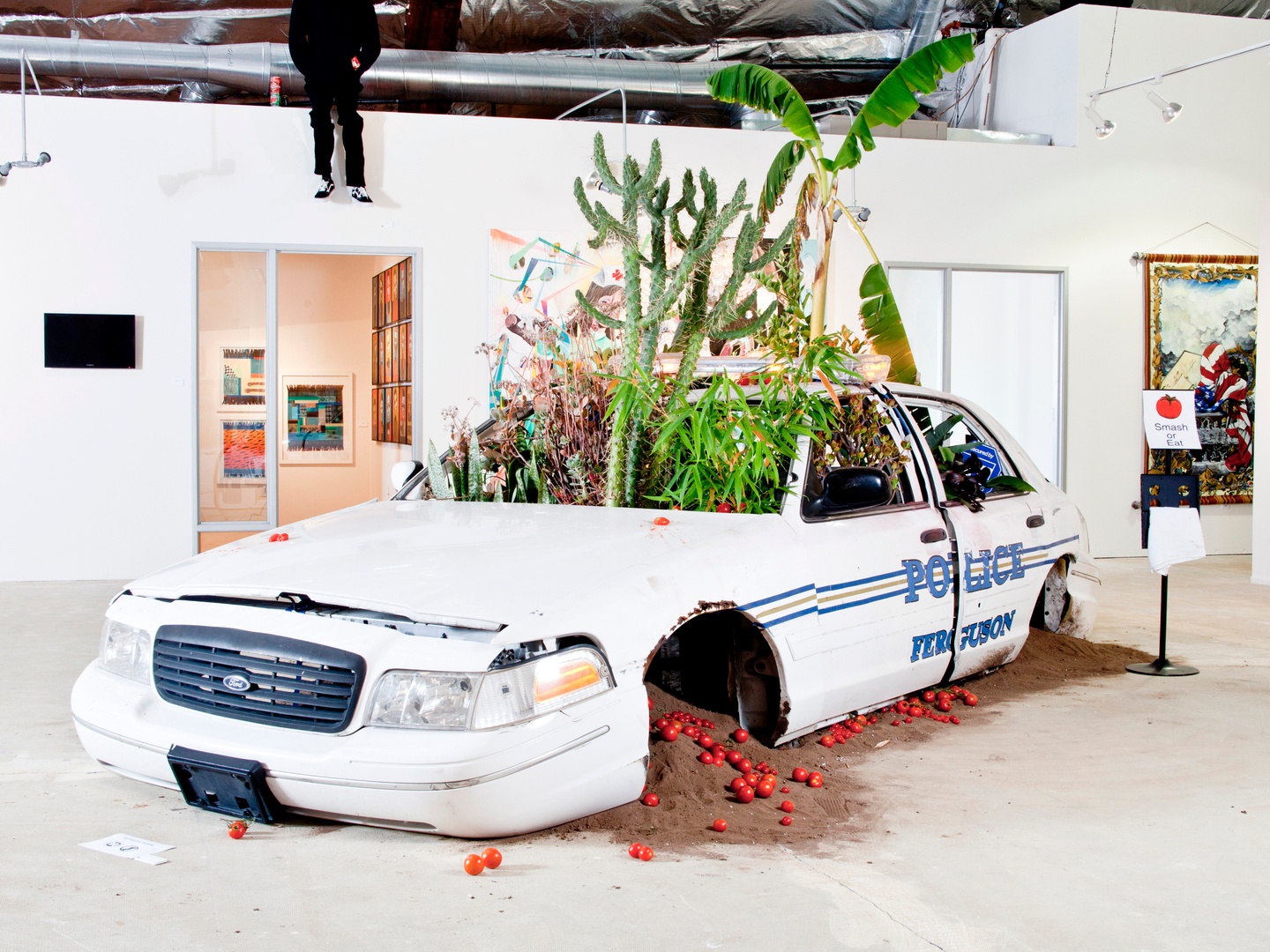Sam Fox School, CRE2, Pulitzer Arts Foundation welcome artist-in-residence Jordan Weber
2021-03-02 • Liam Otten

Jordan Weber, “American Dreamers Phase 2,” 2014-15. Installation view. Photo courtesy of the artist.
Foliage erupts from a deconstructed police cruiser. An urban farm in north Minneapolis reflects basketball geometry. A functioning greenhouse—located in the heart of north Omaha, Neb.—marks the birthplace of Malcolm X; hosts workshops and public programs; and provides seedlings for a community garden.
Jordan Weber, a multidisciplinary artist and activist based in Des Moines, Iowa, has earned a national reputation for creating sculptures, murals, installations, and community projects that investigate the intersection of social justice and environmental racism. Now, Weber is exploring questions of incarceration and healing in St. Louis as artist-in-residence for a new project centered on the “Close the Workhouse” campaign.
The initiative represents a collaboration between the Pulitzer Arts Foundation and Washington University in St. Louis’ Sam Fox School of Design & Visual Arts as well as the University’s new Center for the Study of Race, Ethnicity & Equity (CRE2). It is funded through an endowment created by Emily Rauh Pulitzer to support collaboration between the Pulitzer and the Sam Fox School. Weber’s residency will include multiple site visits to St. Louis; virtual and in-person critiques and studio visits with Sam Fox School students; and a public conversation with local scholars and activists on topics relating to his work.
Engaging in St. Louis

Jordan Weber.
Over the years, Weber’s work has engaged with issues and conditions in the St. Louis area. In 2014, he traveled from Des Moines to Ferguson, Mo., to participate in protests following the death of Michael Brown. In response to these protests, Weber created American Dreamers Phase 2 for the exhibition Manifest: Justice in Los Angeles. Conceived with the help of Los Angeles legend Ron Finley, who sparked the international guerrilla gardening movement, the installation consisted of a decommissioned police vehicle, purchased on Craigslist, filled with Ferguson soil and transformed into a functioning community garden.
In 2020, Weber’s work was included in America’s Mythic Time, an exhibition investigating the impact of racial profiling and “carceral capitalism,” which was presented by The Luminary and local legal advocacy organization ArchCity Defenders. He previously showed at the Intersect Arts Center in the group exhibition Plaid Progress (2017).
Environmental Racism and the Arts
At 6p Tuesday, March 9, Weber will discuss his work as part of a panel discussion on Environmental Racism and the Arts. Presented as part of the Sam Fox School’s spring Public Lecture Series, the conversation will feature Michael Allen, senior lecturer in architecture, landscape architecture, and urban design in the Sam Fox School; Inez Bordeaux, organizer for “Close the Workhouse” and manager of community collaborations at ArchCity Defenders; and Geoff Ward, associate director of CRE2 and professor of African and African-American studies in Arts & Sciences at Washington University.
The talk, which will be hosted on Zoom, is free and open to the public, though registration is required.
About the Artist
Born in Des Moines in 1984, Weber is best known for a series of urban land remediation projects on vacant lots and for his deconstructed police vehicles, which have been turned into community gardens. Weber has exhibited at WhiteBox in New York; the Bemis Center for Contemporary Arts in Omaha; the Des Moines Art Center; Manifest: Justice and No Gallery in Los Angeles; and Macalester College in St. Paul, Minn. He has received numerous awards and fellowships, including the Joan Mitchell Award for Sculptors, Creative Capital NYC Award, A Blade of Grass fellowship, Tanne Foundation Award, and the African American Leadership Forum Award. In 2019-20, he served as an artist in residence at the Walker Art Center in Minneapolis.
For more information, visit jordanjweber.madewithcolor.com.
“Close the Workhouse”
The “Close the Workhouse” campaign is dedicated to the closure of St. Louis’ Medium Security Institute (better known locally as the Workhouse). “Close the Workhouse” also seeks “an end to wealth-based pretrial detention and the reinvestment of the money used to cage poor people and Black people into rebuilding the most impacted neighborhoods in this region.” For more about the campaign, visit closetheworkhouse.org.